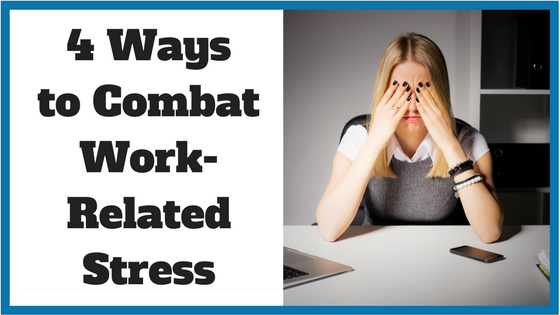- You are here:
- Home »
- Career Advice
- » 4 Ways to Combat Work-Related Stress
4 Ways to Combat Work-Related Stress
Physical well-being and safety are the main area that we tend to look at when it comes to workplace health, but your mental health is just as important. However, it often gets overlooked.
When the workload gets too much, individuals start to struggle and can find it hard to cope as more and more demands get passed onto them. Work-related stress is a significant cause of illness and it links to high levels of sickness, staff turnover and errors within the production line.
Stress does not pick and choose who it effects, it can hit anyone at any level of business – studies have proven that it doesn’t matter which sector you work in, although some careers have been considered more stressful than others. On that note, what can be seen as stressful to one person may be normal to another; people are affected in different ways.
Stress can also show itself in many different ways, so it’s important to recognize the signs of stress and combat it before it get worse and you are forced to seek professional help or take stress-related leave from work.
There are a number of ways that you can reduce stress in the workplace and create a calm atmosphere, you just need to work through them and track what triggers your stress and then what resolves the stress you are experiencing.
1. Recognize and track the triggers
You need to understand what causes you to become stressed, even if it is just a small period of worry, because if they are identified early, action can be taken before the pressure becomes a problem and may also make it easier to reduce and eliminate the causes. Use a journal for a week or two to track your triggers. Record your thoughts, feelings and the situations that arise at work that trigger your stress and also keep notes on how you reacted. Did you become upset and withdraw from the situation? Did you get up and take a walk? Did you raise your voice? If you take notes you may be able to find patterns in what triggers your stress and your reactions to them.
2. Develop healthy responses
When faced with stress, some people turn to certain vices like alcohol, drugs or junk food to alleviate those feelings. And while these methods may offer some temporary relief, they typically end up making that person feel much worse about themselves and the situation. Instead of opting for this short-lived relief, it’s important to develop healthy responses to stress.
Next time you find yourself overwhelmed or stressed, do something you enjoy to ease the tension. Perhaps you can go outside for a short walk and get some fresh air, read a book, go get a coffee or drink of water, practice mindful breathing or meditate, listen to your favourite song or whatever helps you calm down in that moment.
There are also long-term solutions to stress. Regular exercise, a healthy diet and a good night’s sleep can all have a positive effect on your stress levels, so make a point to be more mindful of what you are doing in your day-to-day to help with stress.
3. Take time to recharge
To avoid burning out you should take time to recharge and return our minds to a place that isn’t full of stress and worry. When we leave work we need to ‘switch off’. Out-of-office hours should be used to enjoy our social life without the stress and burden of work hanging over us – take time off to relax and unwind and take part in non-work related activities. Doing so will help us come back to work and regenerate with a positive mind and a positive attitude towards the workplace.
Again, take time for self care – taking a long bath, reading a book in the sunshine, spending time with your family, painting, playing with your pet – whatever it is that makes you feel happy and relaxed.
4. Talk to your supervisor
Employees who are not under stress are more likely to be productive, so if you speak to your manager or supervisor and tell them the issues that you have, they will likely work with you to create an effective plan that resolves the triggers that you have highlighted. Not only would this help you to combat stress but it also encourages the team you are working in to also speak out if they are feeling the same and this can hopefully help the colleagues around you.
There are courses designed to help staff members manage responsibilities in the workplace that reduce work-related stress. Courses are created for managers, supervisors and employees to help them identify and prevent any causes of stress before it leads to stress which progresses.
Thinking that you need to find a less-stressful work environment, but aren’t sure how to go about making a career change? A career coach can help! Browse our directory of career coaches and get a FREE consultation or request a` personalized coach recommendation!
About the Author Alicia Clarke
Alicia Clarke is a Brand Relationship Executive who specialises in working with companies in the finance, technology and insurance sector to help them reach a valuable audience. She has a passion for helping clients to create high quality content online. Find her on Twitter or LinkedIn.


